Klarna, the Swedish-based fintech company, has taken the online shopping world by storm. Founded in 2005, Klarna's buy-now-pay-later (BNPL) model has made it attractive to shoppers looking for flexible payment options. Klarna is looking to branch further into territory occupied historically by credit card companies.
YOUR CAPITAL IS AT RISK
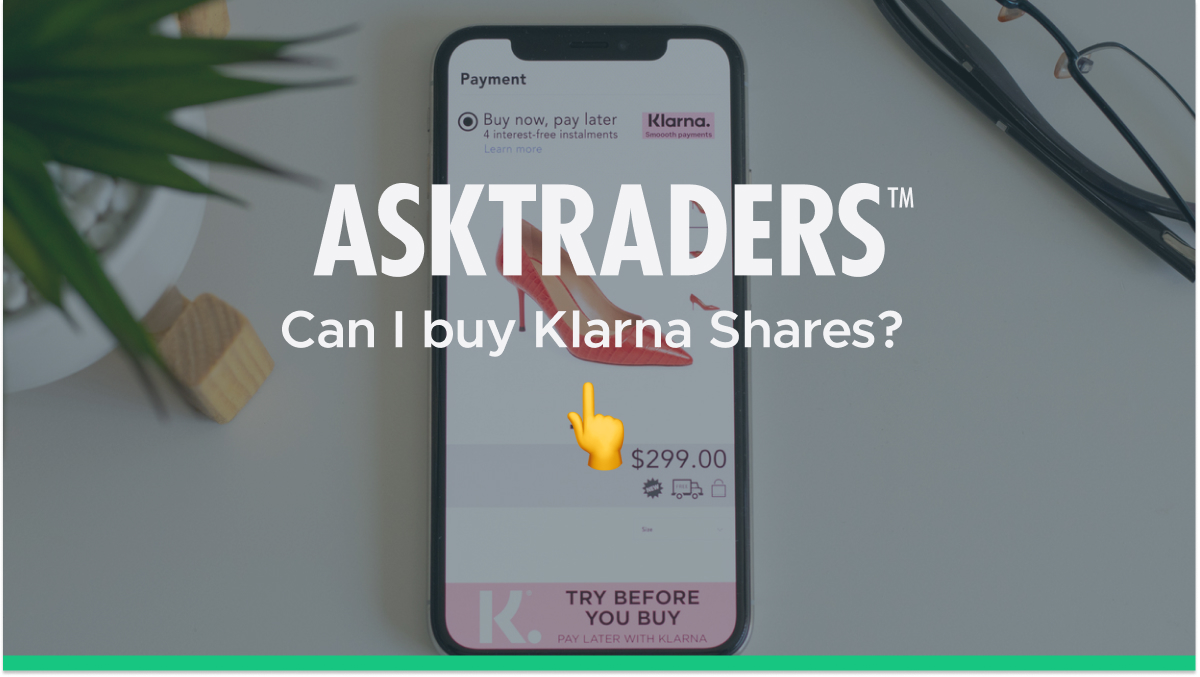
- Shares in Klarna are not currently tradable on the open market.
- How investors can indirectly invest in Klarna
- Investing in Klarna competitors
As Klarna continues to grow and expand globally, many investors are interested in buying shares in the company. In this article, we'll explore how to purchase shares in Klarna and what investors should consider before investing.
The post-pandemic decline in online shopping slowed growth in the sector, damaging company valuations considerably. Despite the deflation of the hype, Klarna's last financing round valued the company at $6.7b.
Klarna is not a publicly-traded company, making it impossible to buy shares of it directly. However, it is possible to invest indirectly by buying shares in its subsidiaries – for Klarna, this means buying shares in its investors. Venture capital firms and private equity firms, Dragoneer Investment Group NASDAQ:DGNS (DGNS) and Visa NYSE:V (V), are two possible indirect investments that traders can make in Klarna.
Table of contents
Indirect ways to invest in Klarna
Visa Corp NYSE:V (V)
The global payments technology company Visa also invested in Klarna in 2017. As part of the investment, Klarna and Visa agreed to a global partnership that would allow Visa's network of merchants to offer Klarna's payment solutions to their users. This partnership has helped Klarna expand its reach and attract new customers.
Investors can indirectly invest in Klarna by buying Visa (V) shares. Visa is a publicly-traded company, and investors can purchase shares in Visa through a brokerage account. Visa's investment in Klarna is a relatively small part of the company's overall business, so investors should not expect to see a significant impact on Visa's stock price due to Klarna's success or failure.
Before investing in Klarna through Dragoneer or Visa, investors should carefully consider their investment goals and risk tolerance. Investing in any company, especially private or SPAC, can be risky and volatile. Investors should also thoroughly research the companies and their financials and consult with a financial advisor if necessary.
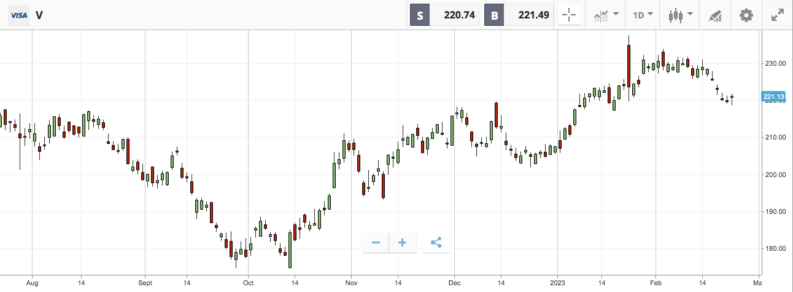
YOUR CAPITAL IS AT RISK
Commonwealth Bank ASX:CBA (CBA)
Klarna is a rapidly growing fintech company that provides payment and shopping services to consumers and merchants globally. The company has gained significant traction in recent years, with over 18 million active users and partnerships with over 250,000 merchants worldwide.
Klarna has also expanded its offerings to include personal finance and banking services.
Investing in Klarna indirectly by buying Commonwealth Bank (CBA) stock could be a good idea for several reasons. CBA is a large Australian bank and one of Klarna's early investors, owning a 5.5% stake in the company.
As Klarna continues to grow, CBA may benefit from the increase in the value of its Klarna shares. Additionally, CBA's investment in Klarna could provide it with insights into the fintech industry and potential opportunities for collaboration.
Before investing, there are a few things you should consider. Firstly, it's essential to research and fully understand the risks involved in investing in the Commonwealth Bank.
Like all investments, there is no guarantee of returns, and the stock's value could go down or up. Secondly, it's important to assess the potential impact of Klarna on CBA's overall performance.
While Klarna's growth potential is attractive, it's necessary to consider whether its contribution to CBA's revenue is significant enough to warrant investment.
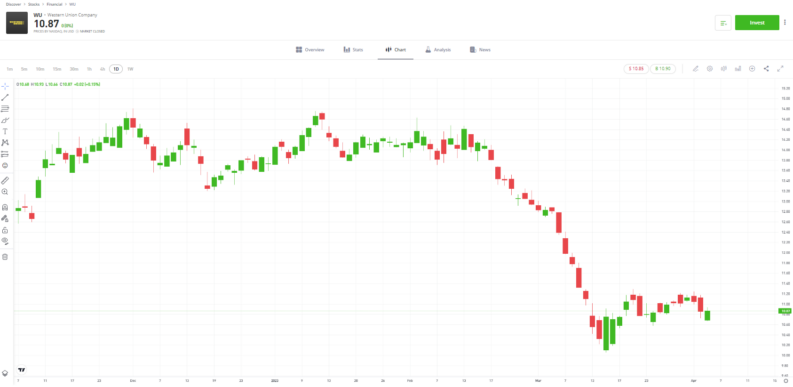
YOUR CAPITAL IS AT RISK
Wait for the IPO
For the patient few, waiting for the firm to progress to an initial public offering (IPO) is ideal.
Klarna has not yet announced plans to go public, but an IPO would allow investors to buy Klarna shares. However, it's important to note that investing in IPOs can be risky. The shares tend to experience high volatility at the initial listing as the market digests all the available information.
With the BNPL model still growing rapidly and entwining itself in the wider eCommerce universe, it will likely be some time before the board considers this next stage in its development via a public listing of its equity.
Alternative investments
If you are interested in trading in Fintech, there are other ventures and opportunities to invest in. Two of these investments include Afterpay ASX:SQ2 (SQ2) and PayPal Holdings NASDAQ:PYPL (PYPL).
Western Union NYSE: WU (WU)
Payment provider Western Union is one of the firms which has fallen out of favour with investors. This is mostly due to the invasive nature of new competitors, such as Klarna. The Western Union stock traded as high as $25 in April 2021, but has since then traded as low as $10 per share.
A falling stock price is a clear signal that a firm is facing significant challenges; Western Union certainly falls into that category. However, at the current price level, there are plausible reasons to consider that now is the time to buy.
Western Union has a strong track record in terms of paying dividends. Over the past 16 years, the firm has never reduced its dividend, although it was frozen on one occasion.
The fall in share price has resulted in the WU dividend yield now being an impressive 8.61%.
Some investors will be uncomfortable with the fact that the firm recently paid out 98% of its free cash flow as dividends. This action does indicate that the firm has limited scope for growth, as otherwise it would be holding back capital for new projects. Organic growth could materialise as the firm has a strong foothold in emerging markets. Western Union’s mix of online and bricks-and-mortar services especially suit the African market as consumers may have limited access to internet connectivity.
Afterpay ASX:SQ2 (SQ2)
In August 2021, Afterpay and American payments company Block, Inc. announced they had entered into arrangements for Square to acquire Afterpay for US$29 bn (A$39 bn). The deal was completed on January 31, 2022. Investors can gain access to the fintech and, in particular, the BNPL space by investing in SQ2.
Afterpay is a leading BNPL provider operating in several markets worldwide, including Australia, the United States, the United Kingdom, and Canada.
Growing Market: the BNPL industry is rapidly growing, and Afterpay is one of the leading players in this space. According to a report by Allied Market Research, the global BNPL market is expected to reach $22.9 bn by 2026, representing a CAGR of 33.7% from 2019 to 2026.
Focus on Responsible Lending: Afterpay's business model focuses on responsible lending, which may help reduce the risk of loan defaults and increase customer loyalty. Afterpay performs credit checks on its customers, and its “pay in 4” model allows customers to spread their payments over a short period, reducing the risk of overborrowing.
Strategic Partnership: in August 2020, Afterpay announced a strategic partnership with Chinese e-commerce giant Alibaba, which could provide significant growth opportunities in the Chinese market.
Overall, Afterpay's strong market position, focus on responsible lending, and solid financial performance makes it an attractive investment opportunity for investors to gain exposure to the rapidly growing BNPL industry.
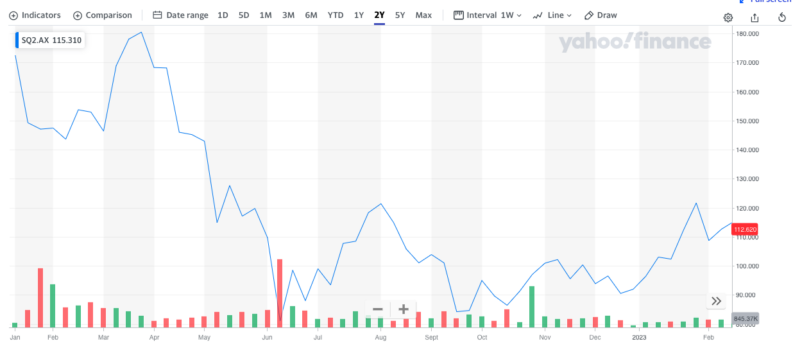
YOUR CAPITAL IS AT RISK
PayPal Holdings NASDAQ:PYPL (PYPL)
PayPal is a global leader in online payments and digital transactions, operating in over 200 markets worldwide. There are several reasons why PayPal may be a good investment.
- PayPal has a strong market presence,
- Over 400 million active user accounts worldwide.
- The company is accepted by millions of merchants globally,
- Its brand recognition and customer loyalty give it a significant competitive advantage.
The e-commerce market continues to grow, and PayPal is well-positioned to benefit from this trend. According to eMarketer, global e-commerce sales are projected to reach $6.4tn by 2024, representing significant growth opportunities for PayPal.
PayPal has a strong focus on innovation, and the company has been investing in emerging technologies such as blockchain and digital wallets. This focus on innovation has allowed PayPal to stay ahead of the curve in the rapidly evolving digital payments industry.
PayPal's established market presence, focus on innovation, and strong financial performance make it an attractive investment opportunity for investors seeking exposure to the growing digital payments industry.
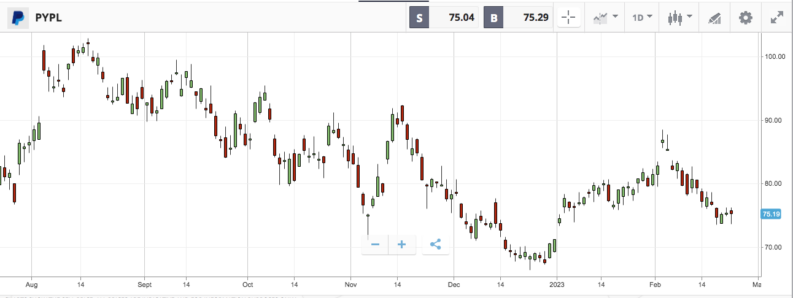
YOUR CAPITAL IS AT RISK
Final thoughts
Fintech investing has become increasingly popular in recent years, and for a good reason. Fintech companies are leveraging technology to disrupt traditional financial services and are experiencing rapid growth.
There are several reasons investors should consider fintech investing, including the potential for significant returns, the ability to gain exposure to innovative companies, and the opportunity to invest in a rapidly evolving industry.
However, investing in fintech is not without risk. Fintech companies operate in a highly regulated environment, and changes to regulations or compliance issues could impact a company's operations and financial performance. Additionally, investing in BNPL companies like Klarna carries unique risks, such as the potential for increased regulatory scrutiny, consumer debt risks, and potential credit losses.
Despite the risks, Klarna is worth considering for investors looking to gain exposure to the BNPL industry. Klarna is one of the leading BNPL providers globally, with a presence in over 20 countries and partnerships with over 250,000 merchants.
The company has experienced rapid growth in recent years, with revenue increasing by 40% in 2020 to $1.2 bn. Klarna also strongly focuses on innovation, recently announcing plans to launch a new shopping app and expand its offerings beyond BNPL.
Investing in Klarna could provide investors with exposure to a rapidly growing industry and the potential for significant returns. However, as with any investment, they should carefully consider the risks associated with investing in fintech and BNPL companies, conduct thorough research, and diversify their investment portfolio to manage risk.










